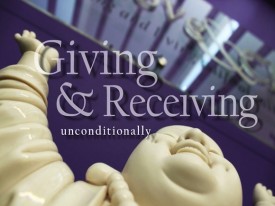The first chapter of my book, Give and Be Rich, is titled “Giving Simply to Give”. Its premise seems simple: just give for the sake of giving. But it’s not as easy as it sounds.
I remember trick-or-treating on Halloween many, many moons ago, and the time that a man tricked instead of treated. He would place a full-sized Eat-More chocolate bar deep into trick-or-treaters’ candy bags with one hand, and then, as they were leaving, tug on an invisible string with the other hand and pull the candy bar back out. Most kids didn’t notice, but I did, and smiled at him to let him know that I was onto his trick. More recently, a teacher of mine from California used the term ‘sticky giving’ to represent the concept of giving with expectations or conditions, which resonated with me and reminded me of this Halloween experience. Sticky giving, for sure.
Sticky giving, or giving with conditions—whatever you choose to call it—is the act of giving to someone with an expected result and not simply for the sake of giving. In workplace relationships, we may give someone some extra help to fulfill our own hidden agenda of being noticed or praised. We may also wonder why colleagues don’t give back to us in the same way we’d give to them. In both of these scenarios, we are giving with conditions.
Here’s an excerpt from Give and Be Rich:
Giving unconditionally is key. If we simply give without the expectation of receiving anything in return, we are giving properly. Many people, however, give with conditions attached. They have an underlying motivation for giving; one common motivation is recognition, another is control. This is our ego working, wanting to be right, wanting to be noticed, wanting to protect us from being vulnerable. I believe that the hearts that give – in any capacity and without any expectation of return or favor – will be the most richly blessed. Furthermore, when we give in secrecy or anonymity, we receive in greater abundance. Give without the expectation of receiving anything in return. When you give with the intention of getting something back, you just don’t make the same impact.
Having written the book on giving, and having lived through some tough life lessons since its publication, I’m visiting this concept again. Even I have a hard time giving without conditions, especially in situations when my emotions are running high or my own insecurities are flaring up, causing me to speculate why someone I’ve given to won’t acknowledge my generosity or fully receive my gift.
There are some deeper questions we can ask ourselves about our attachments to giving with conditions. If you’re disappointed in the response you get from giving to someone, or if you feel the need to shout from the rooftops about your generosity, give yourself some time to really contemplate the following. Ask yourself:
Why do I need other’s acknowledgement?
Why do I need other’s recognition?
Why do I need to be right?
Why do I need to be noticed?
Why do I need to protect myself from vulnerability?
As for other’s behaviour, I have two comments. First, know what’s yours and what’s not yours in situations where others are involved. When you give to them, that act of giving belongs to you. How they choose to respond belongs to them. Focus on what’s yours, and let go of what belongs to others. Maintain your energy for your own gain, and put it to good use within, rather than trying to control and change others.
Second, people do the best with what they know. They have a certain set of tools, and use them with the skills they’ve developed—or not developed. If someone’s unwilling to receive what you give them, or not mannered enough to acknowledge it or respond appropriately, understand that this is just where they’re at. Their reaction doesn’t represent where you’re at or what you deserve.
You can thank yourself for giving gifts that others don’t thank you for. You may also decide to put your energies elsewhere the next time you’re feeling generous. For every action or no action, there is a consequence or a choice of something new.
The hearts that give without any expectation of return or favour will be the most richly blessed. Simple, but not easy.
Best wishes for unconditional giving,
Penny
* The third chapter of Give and Be Rich is about giving to yourself. Giving and growing rich is an inside job. What if we could just love ourselves enough, and give ourselves away in service to others? What if we just loved ourselves unconditionally? Acknowledged ourselves, recognized ourselves and allowed ourselves to be vulnerable? We wouldn’t need it from any other source—except, perhaps, a divine source such as a Creator, God, Buddah, or whatever you choose to name it. In that sense, our backs are always covered.



